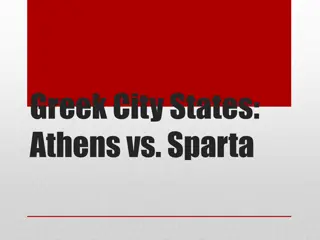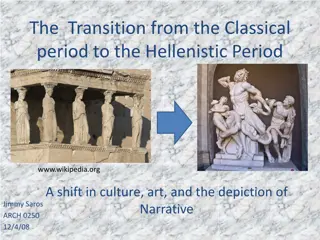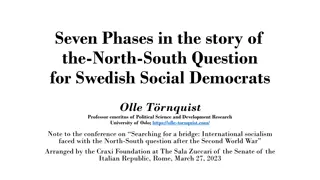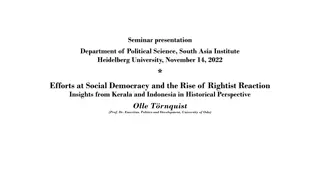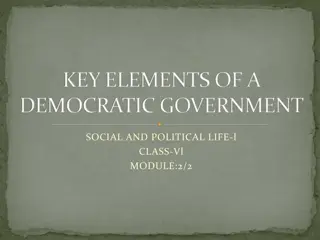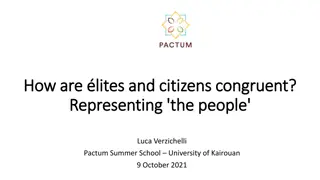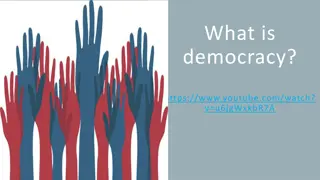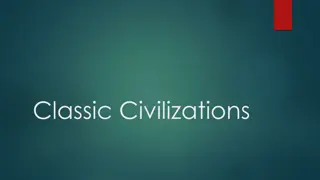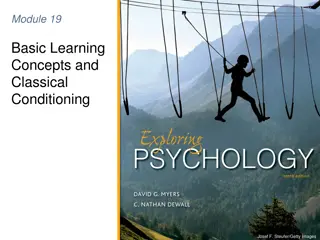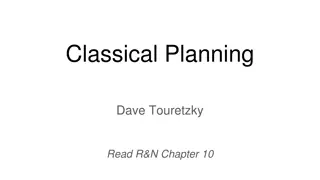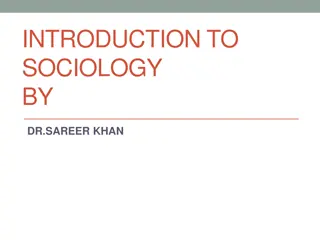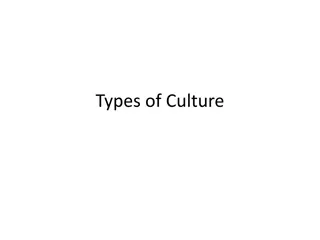The Culture of Democracy in Classical Athens
Explore how democracy shaped fifth-century Athenian culture, from the rise of Classical Athens and the formation of the Delian League to the perspectives of Corinthians and Pericles. Delve into the characteristics of Athenian democracy, its innovative nature, and principles of unity, equality, meritocracy, freedom, and reason. Discover how Athens, like a tech startup, embodied proactive, outward-looking, and cooperative ideals for optimal outcomes.
Download Presentation

Please find below an Image/Link to download the presentation.
The content on the website is provided AS IS for your information and personal use only. It may not be sold, licensed, or shared on other websites without obtaining consent from the author. Download presentation by click this link. If you encounter any issues during the download, it is possible that the publisher has removed the file from their server.
E N D
Presentation Transcript
Democracy and Imperialism LECTURE 6: THE CULTURE OF DEMOCRACY
The rise and rise of Classical Athens 478: formation of Delian League 480s-450s: Athens in conflict over whether or not to become more democratic Victory of pro-democratic interests drives intensification of imperialism 449/8: Peace of Callias. Delian League = Athenian Empire Prominent leisure-class families play leading role in establishment of democracy and expansion of empire
The culture of democracy To what extent is fifth-century Athenian culture shaped by democracy? Is there a real democratic culture , or only the culture of Athens, a polis that happens to be a democracy?
The Corinthians on democratic Athens The Athenians are addicted to innovation, and their designs are characterized by swiftness alike in conception and execution. ( ) They are adventurous beyond their power, and daring beyond their judgment, and in danger they are sanguine. ( ) They are swift to follow up a success, and slow to recoil from a reverse. Their bodies they spend ungrudgingly in their country's cause; their intellect they jealously husband to be employed in her service. A scheme unexecuted is with them a positive loss, a successful enterprise a comparative failure. The deficiency created by the miscarriage of an undertaking is soon filled up by fresh hopes; for they alone are enabled to call a thing hoped for a thing got, by the speed with which they act upon their resolutions. ( ) To describe their character in a word, one might truly say that they were born into the world neither to have peace nor to let others have it. Thucydides 1.70.2-9
Pericles on democratic Athens Our constitution does not copy the laws of neighbouring states; we are rather a pattern to others than imitators ourselves. Its administration favours the many instead of the few; this is why it is called a democracy. If we look to the laws, they afford equal justice to all in their private differences; if to social standing, advancement in public life falls to reputation for capacity, class considerations not being allowed to interfere with merit; nor again does poverty bar the way, if a man is able to serve the state, he is not hindered by the obscurity of his condition. The freedom which we enjoy in our government extends also to our ordinary life. There, far from exercising a jealous surveillance over each other, we do not feel called upon to be angry with our neighbour for doing what he likes, or even to indulge in those injurious looks which cannot fail to be offensive, although they inflict no positive penalty. Thucydides 2.37.1-2
A democratic culture? Athens as a tech startup: proactive, outward-looking, innovative Unity Equality Meritocracy Freedom Reason, deliberation and cooperation create optimal outcomes (Ober, Raaflaub, Balot)
Things to consider Are we right to characterise the citizen body as free and equal? Who is excluded from the citizen body? How does democracy affect them? Is democratic culture an attained reality or a goal?
The citizen body Athens in 431: c. 60,000 adult male citizens. How unified is this community? Differences in wealth, social status, social mobility Differences in occupation/source of livelihood Differences in access to institutions (Assembly, law courts, religious spaces)
Equality as ideology How can it be right that citizens of the same state should be held unworthy of the same privileges? Thucydides 6.38.5 Citizens must be considered equal, or else the vote, freedom to speak in the Assembly, and randomised selection for office have no legitimacy Athenians therefore develop shared self-image as citizens
The Athenian citizen makes his living from agriculture is free/nobody s dependent owns slaves serves as a hoplite supports the democracy
The other citizens Everywhere on earth, the rich [literally the best people ] are opposed to democracy. Old Oligarch, Constitution of the Athenians 1.5 I had been enrolled by Orthobulus for service in the cavalry: I saw that it was everyone s opinion that, whereas the cavalry were assured of safety, the infantry would have to face danger; so, while others mounted on horseback illegally, without having passed the scrutiny, I went up to Orthobulus and told him to strike me off the roll, as I thought it shameful, while the majority were to face danger, to take the field with precaution for my own security. Lysias, For Mantitheus (16.13)
The other citizens (2) The trades known as the trades of artisans are decried with good reason, and held in utter disdain in our states. They disfigure the bodies of those who practice them, forcing them to sit still and in the shade, and in some cases to spend the whole day by the fire. The softening of the body involves a serious weakening of the mind, and especially these artisan s trades leave one without spare time for one's friends and city, so that those who follow them are known to be bad at dealing with friends and bad defenders of their country. In fact, in some of the states, and especially in those reputed warlike, it is not even lawful for any of the citizens to pursue an artisan s trade. Xenophon, Oeconomicus 4.2-4 The best city will not make labourers citizens. Aristotle, Politics 1278a.8
The other citizens (3) This is why the poor and the common people there rightly have more than the noble and rich; because it is the common people who row the ships and who add to the power of the city ( ) much more than the hoplites and the noble men and good men. Old Oligarch, Constitution of the Athenians 1.2 It is not necessary for political communities to include the teeming population that grows up around the naval mob (nautikos ochlos). There is no need for these people to be part of the polis. Aristotle, Politics 1327b.7-8
Citizen women Citizen status carefully guarded; essential after Citizenship Decree of 451 No political rights or representation; no right to speak in court or Assembly No right to inherit or own property Heiresses without male offspring forced to marry male relatives Women play prominent role as priestesses and in religious festivals
The (idealised) role and status of women Great will be your glory in not falling short of your natural character; and greatest will be hers who is least talked of among the men, for good or for bad. Thucydides 2.45.2 Do you know, then, of anything practised by mankind in which the masculine sex does not surpass the female on all these points? Must we make a long story of it by alleging weaving and the watching of pancakes and the boiling pot, whereon the sex plumes itself and wherein its defeat will expose it to most laughter? Plato, Republic 455c-d What knowledge could she have had, Socrates, when I took her for my wife? She was not yet fifteen years old when she came to me, and up to that time she had lived on a leash, seeing, hearing and saying as little as possible. If when she came she knew no more than how, when given wool, to turn out a cloak, and had seen only how the spinning is given out to the maids, is not that as much as could be expected? Xenophon, Oeconomicus 7.5-6
The role and status of women Your duty will be to remain indoors and send out those servants whose work is outside, and supervise those who are to work indoors, and to receive what comes in, and distribute so much of it as must be spent, and watch over so much as is to be kept in store, and take care that what is set aside for a year is not spent in a month. And when wool is brought to you, you must see that cloaks are made for those that want them. You must see too that the dry corn is in good condition for making food. One of the duties that fall to you, however, will perhaps seem rather thankless: you will have to see that any servant who is ill is cared for. Xenophon, Oeconomicus 7.35-37 When the poor wretch opens the door of his house, Woman controls everything, orders him about, and fights him at every turn. Menander fr. 251, 5-7 How is it possible to prevent the wives of the poor from going out of doors? Aristotle, Politics 1300a.6
The systematic exclusion of women Citizenship Decree blocks non-citizen women s social mobility; citizen women have none to begin with Aristophanes comedies (Lysistrata (411), Assemblywomen (392)) show women seizing power as a comic absurdity Fourth-century philosophers note greater freedom of Spartan women as a bad thing Exclusion of women: a result of democracy?
Metics Late fifth century: free population included some 40% metics (metoikoi, resident foreigners). Their status was severely restricted: Liable for military service and special tax No political representation; not allowed to represent themselves in court No right to buy property or own land
The benefits of immigration Themistocles persuaded the people ( ) to remove the tax on metics and artisans, in order that great crowds of people might stream into the city from every quarter and that the Athenians might easily procure labour for a greater number of crafts. Both these policies he considered to be most useful in building up the city's naval forces. Diodorus of Sicily 11.43.3 But instead of limiting ourselves to the blessings that may be called indigenous, suppose that, in the first place, we studied the interests of the metics. For in them we have one of the very best sources of revenue, in my opinion, inasmuch as they are self-supporting and, so far from receiving payment for the many services they render to states, they contribute by paying a special tax. Xenophon, Ways and Means 2.7
If you build it, they will come Agatharchus of Samos Aglaophon of Thasos Agoracritus of Paros Anaxagoras of Clazomenae Archaeus of Eretria Aristarchus of Tegea Aristippus of Cyrene Aspasia of Miletus Cebes of Thebes Cephalus of Syracuse Choerilus of Samos Cleombrotus of Ambracia Cresilas of Cydonia Democritus of Abdera Diagoras of Melos Diogenes of Apollonia Dionysodorus of Chios Euclid of Megara Euenus of Paros Euthydemus of Chios Gorgias of Leontini Hegemon of Thasos Hellanicus of Lesbos Herodotus of Halicarnassus Hippias of Elis Hippocrates of Chios Hippodamus of Miletus Ion of Chios Lysias of Syracuse Melanippides of Melos Myron of Eleutherae Oenopides of Chios Parmenides of Elea Phaidondes of Thebes Philoxenus of Cythera Phrynis of Mytilene Polygnotus of Thasos Pratinas of Phlius Prodicus of Ceos Protagoras of Abdera Simmias of Thebes Stesimbrotus of Thasos Styppax of Cyprus Terpsion of Megara Theodorus of Cyrene Thrasymachus of Chalcedon Timotheus of Miletus Zeno of Elea Zeuxis of Heracleia
The benefits of a trade network Whatever delicacies there are in Sicily or Italy, in Cyprus or Egypt, in Lydia, Pontus, the Peloponnese, or any other land, all are concentrated in Athens because of her control of the sea. Old Oligarch, Constitution of the Athenians 2.7 From Cyrene silphium stalks and oxhides, from the Hellespont tunny and salted fish, from Italy salt and ribs of beef ( ) Syracuse offers wine and cheese ( ) From Egypt sailcloth and raw materials for ropes, from Syria frankincense. Fair Crete sends cypress wood for the gods, Libya plentiful ivory to buy, and Rhodes raisins and figs sweet as dreams; from Euboea come pears and big apples; slaves from Phrygia, mercenaries from Arcadia. Pagasae provides slaves with or without tattoos, and the Paphlagonians dates that come from Zeus, and shiny almonds ( ) Phoenicia supplies the fruit of the date-palm and fine wheat flour, Carthage rugs and cushions in many colours. Hermippus fr. 63 Kassel-Austin
The role and status of resident foreigners Despite their importance, and despite occasional decrees awarding citizen status to specific groups, metics were increasingly excluded: After 451, offspring of metics and Athenian citizens stripped of citizen status; social mobility for metics blocked From fourth century, it was outright illegal for metics to marry citizens Most metics live in Piraeus, hub of democratic agitation; development of cults transplanted to Athens
Slaves Fourth-century sources estimate Athens had 150,000 or even 400,000 slaves Many slaves are non-Greeks, bought or captured abroad, marked by their simple given names Slaves are ultimate non-citizens Aristotle defines slaves as living tools, condemned to serve by their very nature; the usefulness of slaves differs little from that of animals (Politics 1254b.24)
The ubiquity of slavery That it is necessary for a state that is to be well governed to provide leisure from manual labour is a matter of common agreement. But it is not so easy to determine how this should be achieved. Aristotle, Politics 1269a.34-37 You must each consider what slave you left at home, and then imagine that you have suffered from him the same treatment that I have suffered from Phormio. It is not as if your slave is Syrus or Manes or whatever his name is, while this one is Phormio, for the deed is the same. Those are slaves, and this is a slave; I am master and you are masters. Demosthenes 45.86
Roles of slaves in Athenian society Domestic slaves, servants, wetnurses, hands Public slaves: clerks, archivists, the Archers (police) Agricultural workers settled on masters estates Craftsmen and factory crew Labour gangs hired out for rowing, construction, mining Many households would be able to afford a slave (80-600 drachmai); some rich men owned hundreds
The trouble with slavery They were deprived of their whole country: more than twenty thousand slaves had deserted, a great part of them artisans, and all their sheep and beasts of burden were lost. Thucydides 7.27.5 What if I show you that in some households nearly all the house slaves are in chains and yet continually try to run away, whereas in others they are under no restraint and are willing to work and to stay at their posts? Won't you think that here too I am pointing out to you a notable effect of estate management? Xenophon, Oeconomicus 3.4
Slavery at Athens Most slaves would have lived brutal lives, but: Manumission was possible; rare cases are known of former slaves becoming citizens Anti-democratic sources claim that slaves were less harshly oppressed at Athens supposedly a characteristic of extreme democracy
How to achieve a democratic culture? Systematic exclusion of non-citizens confirms in-group status Public ideology of equality allows citizens to gloss over differences Shared memory of success: tyrant-slayers, war of 507/6, Persian Wars, rule of the sea Joint participation in political institutions Joint participation in public rites and festivals; private cults forcibly made public
A collective past All public spaces commemorate heroes and military achievements Introduction of annual funeral oration: mourning made public and collective Poetry, sculpture, painting, and theatre all address Athens military glory Painted Stoa: a monument to Marathon but also to Miltiades Parthenon, Temple of Athena Nik : monuments to the gods but also to Athens
Man is a polis animal Lot makes political participation theoretically universal State institutions recreated at deme level; local self- government + school of politics Pay for office and jury service creates community of citizens Socrates disciple: It s a map of the whole world. See? This is Athens. Strepsiades: What s that? I don t believe you. I don t see the jurors in session. Aristophanes, Clouds 206-8
Athenian festivals Public festivals at Athens were famously bigger and better, but not unique Most festivals and cults had pre-democratic origins; many remained domain of the elite There was no theoric fund in the fifth century; price of theatre tickets excluded poor citizens Panathenaea, begun to rival the Big Four, did not become a panhellenic event Fifth-century Panathenaea was more imperialist than democratic
The culture of democracy Democracy was a way of life but only for its citizens Democratic culture made possible by ideological exclusion and imperial exploitation Art and literature of Athens served a political purpose: reinforcing the democratic project


